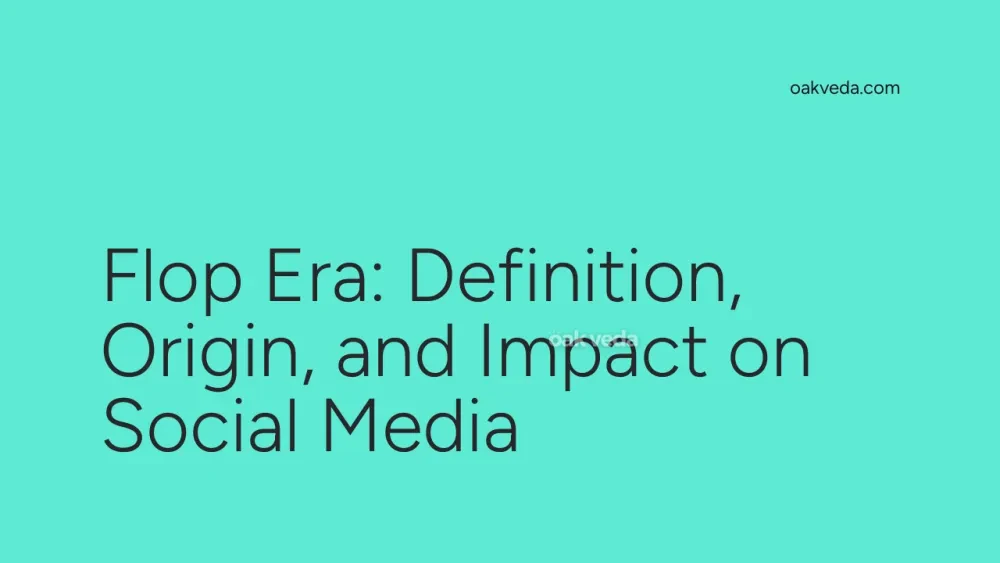
What is Flop Era?
"Flop era" is a popular social media term that refers to a period of decline or failure in someone's life, career, or creative output. This slang expression is widely used across various online platforms to describe a time when an individual, particularly a public figure or artist, experiences a downturn in success, popularity, or quality of work.
Origin and Development of Flop Era
The term "flop era" originated in the entertainment industry, specifically within online fan communities discussing music artists and their careers. It gained traction on social media platforms like Twitter, TikTok, and Instagram, where fans and critics alike use it to analyze and comment on the trajectory of celebrities' careers.
Initially used to describe unsuccessful album releases or tours in the music industry, the term has since expanded to encompass various aspects of pop culture and personal experiences. Its popularity has grown due to the increasing tendency of social media users to categorize and label different periods of life and career trajectories.
How Flop Era Works
In social media contexts, "flop era" functions as a shorthand way to describe and discuss:
- Career setbacks
- Periods of creative stagnation
- Declining popularity or relevance
- Personal struggles or failures
Users often employ the term in self-deprecating humor, saying things like "I'm in my flop era" to describe their own perceived failures or setbacks. It's also frequently used in discussions about celebrities, with fans debating whether a particular album, movie, or career move constitutes a "flop era" for the artist in question.
Popular Examples of Flop Era
Several high-profile examples have contributed to the widespread use of "flop era" in social media discourse:
- Music Industry: When an artist releases an album that underperforms commercially or critically compared to their previous work, fans might label it as part of the artist's "flop era."
- Film and Television: Actors who star in a series of poorly received movies or shows may be described as going through a flop era.
- Social Media Influencers: Content creators who experience a significant drop in engagement or follower count might humorously refer to this period as their flop era.
Impact of Flop Era on Social Media Culture
The concept of "flop era" has significantly influenced how people discuss success, failure, and career trajectories on social media:
-
Normalization of Setbacks: By labeling certain periods as "flop eras," social media users have helped normalize the idea that careers and lives have natural ups and downs.
-
Critical Discourse: The term has provided a framework for fans and critics to analyze and discuss the quality and reception of creative works.
-
Meme Culture: "Flop era" has become a popular meme format, with users creating humorous content around the concept.
-
Personal Branding: Some individuals have embraced their "flop eras" as part of their personal brand, using self-deprecating humor to connect with audiences.
Controversies Surrounding Flop Era
While "flop era" is often used in lighthearted contexts, it has also sparked debates and controversies:
- Mental Health Concerns: Some argue that the constant labeling of career phases as "flops" can negatively impact artists' mental health and self-esteem.
- Subjectivity: Disagreements often arise over what constitutes a true "flop era," as success can be measured in various ways.
- Cancel Culture: Critics suggest that the "flop era" concept contributes to a culture of quick judgments and dismissals in the fast-paced world of social media.
How Brands and Influencers Use Flop Era
Savvy brands and influencers have found ways to leverage the "flop era" concept:
- Self-Aware Marketing: Some brands intentionally reference their own "flop eras" to appear relatable and human to their audience.
- Comeback Narratives: Influencers and celebrities sometimes use the idea of overcoming a "flop era" to create compelling comeback stories.
- Engagement Tactics: Social media managers may use "flop era" references to spark conversations and increase engagement on their platforms.
Future Trends Related to Flop Era
As social media continues to evolve, the use and understanding of "flop era" are likely to change:
- Expanded Application: The term may continue to broaden its meaning, applying to more areas of life and culture.
- Analytical Tools: We might see the development of more sophisticated ways to quantify and analyze "flop eras" in various industries.
- Cultural Shifts: As attitudes towards success and failure evolve, the perception and use of "flop era" may shift accordingly.
FAQs about Flop Era
-
Is being in a flop era always negative? Not necessarily. Many view flop eras as natural parts of any career or life journey, often leading to growth and future success.
-
Can a flop era be intentional? Sometimes. Artists or brands might deliberately step back or experiment, knowing it might not be commercially successful but artistically fulfilling.
-
How long does a flop era typically last? There's no set duration. It can range from a single project to several years, depending on the context and individual circumstances.
-
Can someone declare their own flop era? Yes, it's common for individuals to humorously or self-critically label their own experiences as flop eras on social media.
-
How has the concept of flop era affected fan culture? It has given fans a new way to discuss and analyze their favorite artists' careers, sometimes leading to more nuanced conversations about success and creativity.
Understanding the concept of "flop era" provides valuable insight into how social media shapes our perceptions of success, failure, and the natural ebbs and flows of careers and personal lives. As this term continues to evolve, it will undoubtedly remain a significant part of online discourse and cultural analysis.
You may be interested in:
- Sus: Definition, Origin, and Impact on Social Media
- CEO on Social Media: Definition, Origin, and Impact
- ISO: Definition, Origin, and Impact on Social Media
- Customer Reviews: Definition, Origin, and Impact
- Cap: Definition, Origin, and Impact on Social Media
- Highkey: Definition, Origin, and Impact on Social Media

